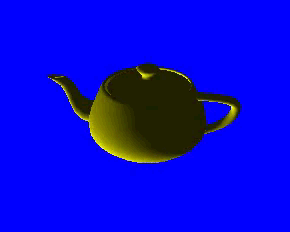DirectX 9.0 C++ 教程 光照
效果图:一个有方向光(Directional lights)照着的茶壶。(根据DirectX SDK 光照例子改编)

对上面这张gif图片是如何制作感兴趣?看截取视频,然后制成gif 教程
Direct3D支持3种光源。
1.点光源(Point lights),2. 方向光(Directional lights),3.聚光灯(Spot lights)
//-----------------------------------------// File: Lights.cpp//// Desc: Rendering 3D geometry is much more interesting when dynamic lighting// is added to the scene. To use lighting in D3D, you must create one or// Lights, setup a material, and make sure your geometry contains surface// normals. Lights may have a position, a color, and be of a certain type// such as directional (light comes from one direction), point (light// comes from a specific x,y,z coordinate and radiates in all directions)// or spotlight. Materials describe the surface of your geometry,// specifically, how it gets lit (diffuse color, ambient color, etc.).// Surface normals are part of a vertex, and are needed for the D3D's// internal lighting calculations.//// Copyright (c) Microsoft Corporation. All rights reserved.//-----------------------------------------#include <Windows.h>#include <mmsystem.h>#include <d3dx9.h>#include <strsafe.h>//-----------------------------------------// Global variables//-----------------------------------------LPDIRECT3D9 g_pD3D = NULL; // Used to create the D3DDeviceLPDIRECT3DDEVICE9 g_pd3dDevice = NULL; // Our rendering deviceLPDIRECT3DVERTEXBUFFER9 g_pVB = NULL; // Buffer to hold verticesID3DXMesh* Objects;//茶壶// A structure for our custom vertex type. We added a normal, and omitted the// color (which is provided by the material)struct CUSTOMVERTEX{ D3DXVECTOR3 position; // The 3D position for the vertex D3DXVECTOR3 normal; // The surface normal for the vertex};// Our custom FVF, which describes our custom vertex structure#define D3DFVF_CUSTOMVERTEX (D3DFVF_XYZ|D3DFVF_NORMAL)//-----------------------------------------// Name: InitD3D()// Desc: Initializes Direct3D//-----------------------------------------HRESULT InitD3D( HWND hWnd ){ // Create the D3D object. if( NULL == ( g_pD3D = Direct3DCreate9( D3D_SDK_VERSION ) ) ) return E_FAIL; // Set up the structure used to create the D3DDevice. Since we are now // using more complex geometry, we will create a device with a zbuffer. D3DPRESENT_PARAMETERS d3dpp; ZeroMemory( &d3dpp, sizeof(d3dpp) ); d3dpp.Windowed = TRUE; d3dpp.SwapEffect = D3DSWAPEFFECT_DISCARD; d3dpp.BackBufferFormat = D3DFMT_UNKNOWN; d3dpp.EnableAutoDepthStencil = TRUE; d3dpp.AutoDepthStencilFormat = D3DFMT_D16; // Create the D3DDevice if( FAILED( g_pD3D->CreateDevice( D3DADAPTER_DEFAULT, D3DDEVTYPE_HAL, hWnd, D3DCREATE_SOFTWARE_VERTEXPROCESSING, &d3dpp, &g_pd3dDevice ) ) ) { return E_FAIL; } // Turn off culling g_pd3dDevice->SetRenderState( D3DRS_CULLMODE, D3DCULL_NONE ); // Turn on the zbuffer g_pd3dDevice->SetRenderState( D3DRS_ZENABLE, TRUE ); return S_OK;}//-----------------------------------------// Name: Cleanup()// Desc: Releases all previously initialized objects//-----------------------------------------VOID Cleanup(){ if( g_pVB != NULL ) g_pVB->Release(); if( g_pd3dDevice != NULL ) g_pd3dDevice->Release(); if( g_pD3D != NULL ) g_pD3D->Release(); if(Objects != NULL) Objects->Release();}//-----------------------------------------// Name: SetupMatrices()// Desc: Sets up the world, view, and projection transform matrices.//-----------------------------------------VOID SetupMatrices(){ // 绕y轴旋转 D3DXMATRIXA16 matWorld; D3DXMatrixIdentity( &matWorld ); D3DXMatrixRotationY( &matWorld, timeGetTime()/500.0f ); g_pd3dDevice->SetTransform( D3DTS_WORLD, &matWorld ); // 摄像机的位置 D3DXVECTOR3 vEyePt( 0.0f, 3.0f,-5.0f ); D3DXVECTOR3 vLookatPt( 0.0f, 0.0f, 0.0f ); D3DXVECTOR3 vUpVec( 0.0f, 1.0f, 0.0f ); D3DXMATRIXA16 matView; D3DXMatrixLookAtLH( &matView, &vEyePt, &vLookatPt, &vUpVec ); g_pd3dDevice->SetTransform( D3DTS_VIEW, &matView ); // 设置视锥体大小 D3DXMATRIXA16 matProj; D3DXMatrixPerspectiveFovLH( &matProj, D3DX_PI/4, 1.0f, 1.0f, 100.0f ); g_pd3dDevice->SetTransform( D3DTS_PROJECTION, &matProj );}//-----------------------------------------// Name: SetupLights()// Desc: Sets up the Lights and materials for the scene.//-----------------------------------------VOID SetupLights(){ // 初始化一个材料 D3DMATERIAL9 mtrl; ZeroMemory( &mtrl, sizeof(D3DMATERIAL9) ); mtrl.Diffuse = mtrl.Ambient = D3DXCOLOR(1.0f,1.0f,0.0f,1.0f); //材质有漫射和环境光的设置,都为黄色 g_pd3dDevice->SetMaterial( &mtrl ); // 初始化一个白色的方向光 D3DXVECTOR3 vecDir; D3DLIGHT9 light; ZeroMemory( &light, sizeof(D3DLIGHT9) ); light.Type = D3DLIGHT_DIRECTIONAL;//方向光 light.Diffuse = D3DXCOLOR(1.0f,1.0f,1.0f,1.0f);//设置光源的漫射光颜色为白色 //光的方向随着时间不断变化 vecDir = D3DXVECTOR3(cosf(timeGetTime()/350.0f), 1.0f, sinf(timeGetTime()/350.0f) ); D3DXVec3Normalize( (D3DXVECTOR3*)&light.Direction, &vecDir );// light.Direction = D3DXVECTOR3(1.0f,0.0f,0.0f);//光的传播方向平行x轴 light.Range = 1000.0f; g_pd3dDevice->SetLight( 0, &light ); g_pd3dDevice->LightEnable( 0, TRUE ); g_pd3dDevice->SetRenderState( D3DRS_LIGHTING, TRUE ); // Finally, turn on some ambient light. g_pd3dDevice->SetRenderState( D3DRS_AMBIENT, 0x00202020 );}//-----------------------------------------// Name: Render()// Desc: Draws the scene//-----------------------------------------VOID Render(){ // 背景为蓝色 g_pd3dDevice->Clear( 0, NULL, D3DCLEAR_TARGET|D3DCLEAR_ZBUFFER, D3DCOLOR_XRGB(0,0,255), 1.0f, 0 ); // Begin the scene if( SUCCEEDED( g_pd3dDevice->BeginScene() ) ) { // 茶壶的材料颜色也定义在这个函数中 SetupLights(); // Setup the world, view, and projection matrices SetupMatrices(); // Render the vertex buffer contents g_pd3dDevice->SetStreamSource( 0, g_pVB, 0, sizeof(CUSTOMVERTEX) ); g_pd3dDevice->SetFVF( D3DFVF_CUSTOMVERTEX ); //创建一个茶壶 Objects = 0; D3DXMATRIX Worlds; D3DXCreateTeapot(g_pd3dDevice, &Objects, 0); Objects->DrawSubset(0); // End the scene g_pd3dDevice->EndScene(); } // Present the backbuffer contents to the display g_pd3dDevice->Present( NULL, NULL, NULL, NULL );}//-----------------------------------------// Name: MsgProc()// Desc: The window's message handler//-----------------------------------------LRESULT WINAPI MsgProc( HWND hWnd, UINT msg, WPARAM wParam, LPARAM lParam ){ switch( msg ) { case WM_DESTROY: Cleanup(); PostQuitMessage( 0 ); return 0; } return DefWindowProc( hWnd, msg, wParam, lParam );}//-----------------------------------------// Name: WinMain()// Desc: The application's entry point//-----------------------------------------INT WINAPI WinMain( HINSTANCE hInst, HINSTANCE, LPSTR, INT ){ // Register the window class WNDCLASSEX wc = { sizeof(WNDCLASSEX), CS_CLASSDC, MsgProc, 0L, 0L, GetModuleHandle(NULL), NULL, NULL, NULL, NULL, "D3D Tutorial", NULL }; RegisterClassEx( &wc ); // Create the application's window HWND hWnd = CreateWindow( "D3D Tutorial", "D3D Tutorial 04: Lights", WS_OVERLAPPEDWINDOW, 100, 100, 300, 300, GetDesktopWindow(), NULL, wc.hInstance, NULL ); // Initialize Direct3D if( SUCCEEDED( InitD3D( hWnd ) ) ) { // Show the window ShowWindow( hWnd, SW_SHOWDEFAULT ); UpdateWindow( hWnd ); // Enter the message loop MSG msg; ZeroMemory( &msg, sizeof(msg) ); while( msg.message!=WM_QUIT ) { if( PeekMessage( &msg, NULL, 0U, 0U, PM_REMOVE ) ) { TranslateMessage( &msg ); DispatchMessage( &msg ); } else Render(); } } UnregisterClass( "D3D Tutorial", wc.hInstance ); return 0;}文章源地址:http://www.waitingfy.com/?p=229
项目下载:http://download.csdn.net/detail/fox64194167/4634973(CSDN下载,免积分)
http://www.waitingfy.com/wp-content/uploads/2012/10/Lights.rar (本站下载)
相关文章:
1.DirectX 9.0 C++ 教程 开发环境设定
2.DirectX 9.0 C++ 教程 第一个程序
3.DirectX 9.0 C++ 教程 绘制三角形
4.DirectX 9.0 C++ 教程 关于Perspective projection,Matrices,摄像头,旋转5.DirectX 9.0 C++ 教程 光照